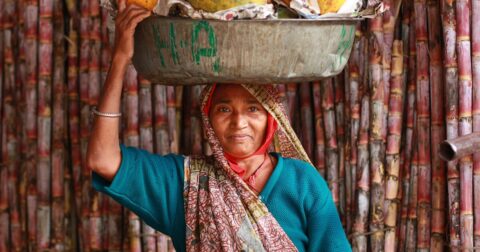Explainer
How the Meat Industry Shapes U.S. Politics (and Vice-Versa)
Law & Policy•11 min read
Perspective
Plant-based foods owe much of their recent success to the Global South. Young people are embracing this rich culinary history as an instrument of change.


Words by Matilde Nuñez del Prado Alanes
Young people have positioned themselves as the leaders of the growing plant-based movement in Western countries. But what about the rest of the world?
Research shows that plant-based diets have grown in popularity over the past decade, particularly in Western countries. In the United States, dollar sales of plant-based foods grew 43 percent between 2018 and 2020, almost two-and-a-half times faster than total food sales during the same time period.
In the UK, plant-based food consumption nearly doubled between 2008 and 2019. The same trend seems to be repeating itself across Europe, where almost half of the population has significantly reduced their meat consumption and 30 percent now identify as flexitarian, according to a 2020 survey from the Smart Protein Project.
But in the Global South, plant-based diets are more than a trend. They are an essential part of the region’s history and a bedrock for long-standing culinary traditions that are being rediscovered by new, plant-forward generations.
Plant-based foods owe much of their recent success to the Global South. But many people have no idea where these foods come from or what cultures they are rooted in.
The global increase in meat consumption, which continues today despite the newfound popularity of plant-based foods, is historically linked to European colonialism and Western influence around the world. In the Americas, most of the animals consumed today were not even a part of most people’s diets prior to 1492, and many cultures maintained a primarily plant-based diet until Europeans arrived.
In Africa and Asia, plant-based eating habits are inextricably linked to religion. Jainism, a religion originating in India, follows a strictly vegetarian diet. Hinduism, Buddhism, and Sikhism, also from India, have factions that practice vegetarianism. Recently, Buddhist vegetarianism has also become popular across East Asia. Many followers of Taoism, which originated in China, are vegetarians too, and much of China’s population, religious or not, still avoids eating meat, eggs, and milk on specific days of the year.
Members of the Coptic Orthodox Church, based in Egypt, practice vegetarian fasting between 180 and 210 days per year. In Ethiopia, according to the latest census, about 43.5 percent of the population is part of the Ethiopian Orthodox Tewahedo Church, one of the few African churches established before the European colonization of the region.
Many of the West’s most popular food trends come from long-standing culinary traditions in the Global South. Quinoa originated in the Andes of South America more than 5,000 years ago. The grain was a staple in the Inca’s diet and is still an important food source among the Quechua and Aymara people today. Similarly, peanuts, which spread from the Andes to Mesoamerica, were widely consumed throughout the region long before the Europeans arrived.
Spirulina, now recognized as a “superfood,” was first called tecuitlatl by the Aztecs, who harvested it from the surface of Lake Texcoco. Prized mushroom varieties such as kallampa and huitlacoche have also been a source of food for various peoples in the American continent since pre-Hispanic times.
Fake meats are not a Western invention either. Although seitan is a relatively recent addition to Western diets, its origin can be traced to China in the 6th century, when wheat gluten was documented for the first time in a Chinese agricultural encyclopedia. Tofu first appeared about 2,000 years ago, also in China, where it quickly spread to Indonesia, Japan, Korea, Vietnam, Singapore, and Thailand. Tempeh, another trendy alternative protein, seems to have originated in Java, now Indonesia, several centuries ago.
Plant-based milk also has roots outside the Global North. People have been drinking milk made from coconut, almonds, and soy, for example, for thousands of years. In Latin America, a drink known as horchata, made from a variety of nuts, seeds, and grains, gained popularity long before Oatly appeared on supermarket shelves.
Despite the Global South’s deep cultural connection to plant-based foods, since the European colonists arrived, eating patterns have shifted towards Western-style diets heavy in processed foods and animal products.
This trend has greatly accelerated in the past two decades. Since 1998, meat consumption increased by 58 percent around the globe, with developing countries in Asia, Latin America, and the Caribbean recording the most substantial growth.
But plant-based diets have not lost their place in the Global South.
Meat consumption has increased considerably in developing countries, but per capita meat consumption remains highest in developed countries in Europe and North America. According to a 2021 report commissioned by Friends of the Earth, meat consumption in China is still less than half of the more than 100 kilograms consumed per capita in developed countries like the U.S. and Australia.
Plant-based diets are becoming more popular, particularly among younger generations, in countries Vietnam, Indonesia, Nepal, Malaysia, Palestine, Pakistan, and the Philippines, among other Asian countries. The same is true of African countries such as Nigeria, Kenya, and Morocco, just to name a few. Plant-based foods have also seen a resurgence in Latin American and Caribbean countries like Ecuador, Colombia, Bolivia, Cuba, Jamaica, and even in places known for their high consumption of meat and dairy, such as Argentina, Uruguay, and Brazil.
New generations are also embracing the Global South’s rich culinary history as an important instrument of change. Young people around the world are showing that, with a little ingenuity and a lot of help from their communities, they can adapt centuries-old plant-based recipes to live more sustainably.